Interview with Terry Brock on Cryptocurrencies, Investing, and Steem!

Would you join Terry Brock and me as we discuss blockchains, technology, Steem, and more, because I think you will love getting to know Terry Brock as much as I have here in this interview today?
Terry Brock Asks Jerry Banfield About Cryptocurrencies, Investing and Steem!
Who is Terry Brock?
On TerryBrock.com the text says, "Internationally recognized hall of fame speaker, marketing coach and author."

I need to come up with something like that on my website. Terry has an amazing TEDx talk that I loved. I will just take the best part that I liked out of it. It says, “Not Yet!” from the matrix. That‘s the summary I enjoyed the most about it.
I’m honored Terry is interviewing me because @terrybrock is a relationship marketing speaker, Terry is a journalist that has interviewed people all over the world, amazing people that you have probably heard of before, and after this awkward introduction on my end I will pass it over to Terry.
Thank you for having me today Terry.
Terry Brock:
Well, Jerry Banfield, it is wonderful to have you on board. You are a legend in the area of social media and particularly on a platform that you and I both share called Steemit.
You have put out a lot of content and video on that, which really goes in depth. I like that one of the things you do Jerry, is you talk about the technology of it, the really in-depth nitty-gritty of various topics and you do a very good job in explaining it in simple English, which is good.

I like that, and then you also talk about other topics that get really personal about how to live with them.
Jerry, I really appreciate you joining us from your offices over there in St. Petersburg, Florida, from my offices here in Orlando, but hey, we have got the whole world in our hands.
Do you get that Jerry?
See the waving?
Complete with a map that has, notice, Australia twice. It’s so nice we had it on here twice.

If you have been to Australia, you will know what I like about that.
Well, Jerry, it’s good to have you with us today.
How are you doing today?
Jerry Banfield:
I’m doing very well. How are you, Terry?
Terry Brock:
Doing really well.
You have done so much in technology. You have worked with it. I know that for a while you had, I think it was a 100 Bazillion people joining you on YouTube.
How many subscribers do you have on YouTube by the way?
Jerry Banfield:
I think there is 220,000 now.
Terry Brock:
220,000 people, that’s a big number ladies and gentlemen, and Jerry has that. But now, Jerry used to do a lot with programs like Dash, and he was into others. He did a lot on YouTube. Still does some things on YouTube, but he is really focusing on Steemit.
Jerry, I would like to turn the floor over to you, give you the microphone to tell us a little bit about why you made the shift over to Steemit from all the success you have had in other areas on Facebook and on YouTube, etcetera.
You still have a little bit of a presence there, but your main emphasis is on Steemit.
Tell us a little bit about yourself and why you are focusing on Steemit.
Jerry Banfield:
I honestly don’t know why I ended up doing Steemit. It seems kind of random if you just look at things. I don’t know why in kind of the big picture. Well, that's not very satisfying, is it?
I can give you the details of how I got into Steemit and what I’ve been doing with it. I see Steem as a cryptocurrency blockchain that has the potential to help us raise our consciousness on this planet and to kind of act as a mirror.
These cryptocurrencies don’t truly offer anything better than what we already have. Each offers something different that improves in some areas, but is worse in other areas than what we have. What I like about Steem is that it is kind of a mirror of the rest of our world.
What goes on with money and influence is transparent on Steem whereas in our real world it’s often difficult to see why we are being promoted to certain food or a certain company. If we saw all the money changing hands, it would make perfect sense like we can on Steem. If we have no idea what Steem is, steemit.com is the main user interface for the Steem blockchain.
This is Terry Brock’s profile here.
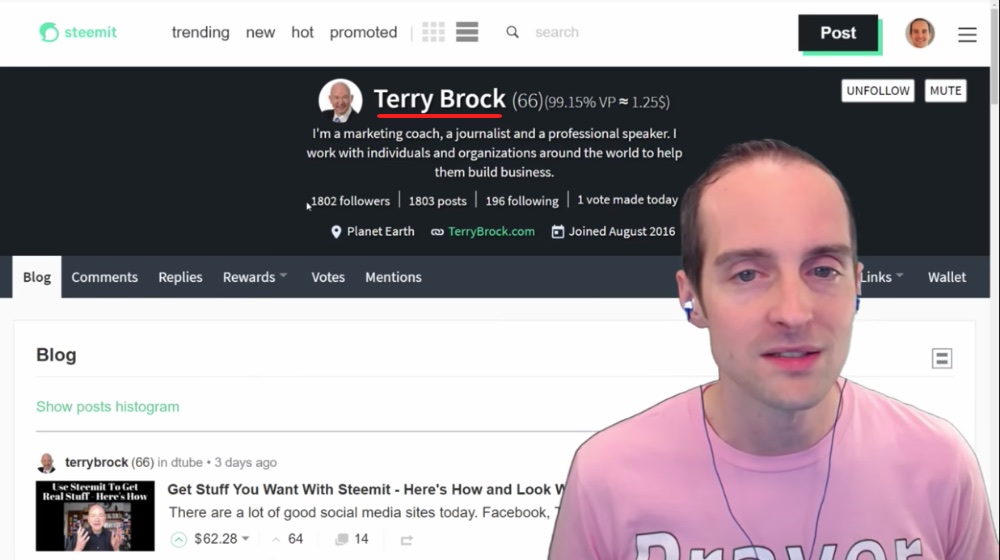
Terry Brock:
As a matter of fact Jerry, what you might do if you don’t mind, is sharing your screen. We can do that on Zoom. Share your screen with us so we can take a look at it, and then we are just going to let you go.
Ladies and gentlemen I can literally just say, “Jerry, have at it. Go for it here. Stream on for like a few hours.” I mean that not in hyperbole, but literally over a few hours and it is like sitting at his feet and going like, “Wow! Oceans of goodness and knowledge are flowing over me now.”
We are going to let you share the screen.
By the way, ladies and gentlemen, I am going to say another thing. This is Jerry’s first time using Zoom and he has just eaten it up like crazy. He is brilliant. He grabs it quickly and goes with it.
But Jerry, if you have any questions about sharing the screen just let me know. Go for it and share your screen with us now.
Jerry Banfield:
Thank you, Terry.
I will do that. I have a hard time trying new things sometimes, believe it or not.
Terry Brock:
You are doing just fine there. There we go. You are on my page on Steemit.
Jerry Banfield:
Terry sold me on Zoom, and now there is no going back to Skype after Zoom.
Terry Brock:
There you go.
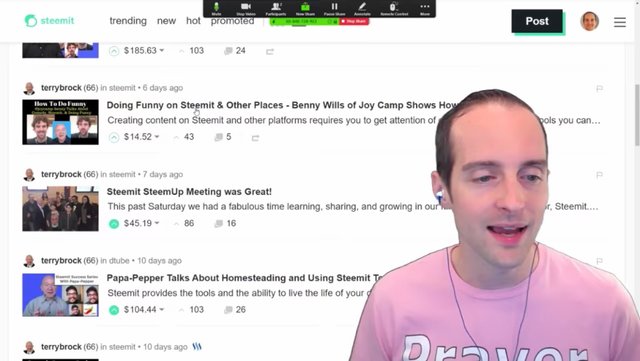
Jerry Banfield:
This is the main user interface for the Steem blockchain. We are on Steemit.com right now, which is the user interface made by Steemit Inc, which is the primary developer and the team that launched, and is the main development team for the Steem blockchain.
What we are looking at is a blockchain that not only has a wallet like Bitcoin, but it has a wallet so we can easily go into Terry’s wallet and take a look at how much Steem Terry has in his wallet.
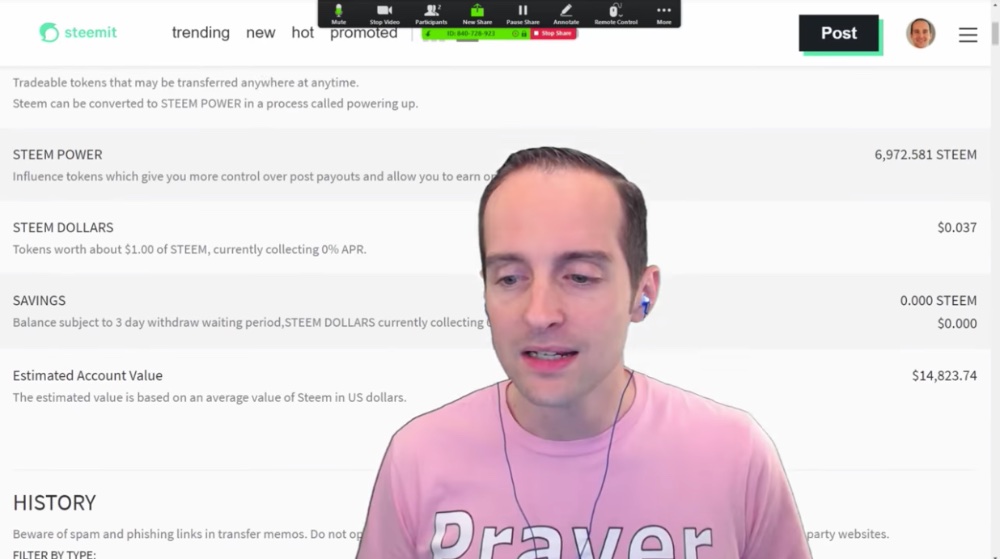
Then we can easily click straight over onto Terry’s blog and read his blog posts. The idea with Steem is a censorship resistance blockchain.
Now, in terms of rewards, downvotes can easily take rewards away, but no matter what someone thinks, like Terry could make the most offensive post in the world, and it still would be there on the blockchain. That’s what’s neat about Steem. It gives us a place where we can share without worrying about getting banned or having a centralized authority suppress what we have to say.
Terry Brock:
Jerry Banfield, let me interrupt you there for a moment.
That’s very important what you just said as a lot of people have noticed they got banned in certain places.

They are getting banned from YouTube, they get banned or this video was banned or that. You don’t see that happen on Steemit and on the accompanying D-Tube. D as in decentralized Tube that ties in with it.
I have seen you have some experience in getting banned or something like that.
What are your thoughts on having a decentralized uncensored platform?
Jerry Banfield:
I think it’s critical for us as human beings to be able to honestly connect with each other because we are in a time where there is a lot of discrete censorship. The public, especially in the US, we live in these huge contradictions where we think we have free speech until we say something that goes against the grain, and then all of a sudden you are censored.
I have a friend who posted an article that went viral on Facebook and it was just going out everywhere in the newsfeed and within 24 hours Facebook censored that. It was removed, you couldn’t go to the URL anymore and the post was not showing anywhere. Facebook stopped that post and on YouTube the same thing happens. We have a lot of discrete censorship that it's not obvious to the average person how this happens.
Terry Brock:
Yes, I think you are right, and you know I look at it and because I am a strong fervent believer in free speech, in people being able to say what they want, even if it is offensive, I think the antidote to bad speech is more free speech, letting people speak.

However, at the same time, I understand when you are on Facebook, you are in their home. When you are on YouTube, you are in their home.
If someone comes over to your home Jerry, you are the kind of guy that is open to all kinds of ideas, but I am sure just like in my home if someone came and did certain activities, and maybe said certain things, I would probably ask them to leave.
I would say, “You have a right to say that, but not in my home.”
I think the difference is now with Steemit, they overtly come out and say, "Look, this is a censorship-free area unless you did something that we would all consider despicable, illegal, etcetera."
At that point the way we do that within Steemit and within D-Tube is we downvote them, and by downvoting them they lose their money, and then they can be off the platform that way. I think that’s another way of using free speech to stifle bad speech.
What are your thoughts on that?
Jerry Banfield:
It has some advantages and disadvantages.
I will share the screen here and take a look.
Terry Brock:
Yes, please.
Jerry Banfield:
On YouTube, what we have is centralized monetization where one company controls all of the money that all the creators are allowed to make and controls all the advertising revenues that funds the creators and allows advertisers to put ads on the website.
On Steemit we have a decentralized model that’s based on stakes. Terry has about 7,000 Steem Power and this is essentially Terry’s influence over what’s posted on Steem. This means that Terry can give himself or anyone else $1.25 or so right now on every single post anyone makes. Terry could also take $1.25 away about 10 times a day from any post he dislikes.
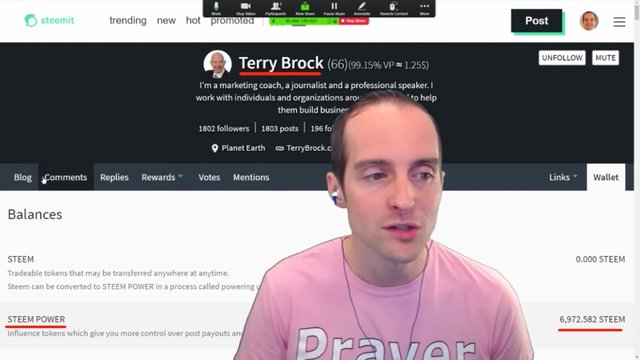
Now, this has benefits because there is no central authority that can then just take your rewards away, but on the downside, anyone who has stakes can come take your rewards away.
I’ve had some of my recent posts where someone simply appears to not like me or wants to get my attention, or need some love and understanding, and then downvotes my posts essentially without what you would think of as the criteria to get a downvote. There is no spam or plagiarism. There is nothing most of us would look at and say why this got downvoted.
Terry Brock:
Yes, very good point.
It’s almost like it is a second-grade playground kind of behavior at times where someone says, “I just don’t like you,” and they downvote. I have seen that kind of behavior happen and I think there is both sides of it.

Jerry Banfield:
Yes, in some ways it’s better because there is no one authority like YouTube or Google that’s responsible to all the advertisers that then essentially systematically downvotes and systematically takes money away from creators that post on certain words or topics, but at the same time, there are very arbitrary rewards.
My wife got essentially maliciously downvoted, thousands of dollars of downvotes on her comments after she just made a post saying, “Hi, I’m Jerry’s wife. Here is my story.”
That was a basic introduction post and one person with a lot of stakes who didn’t like her, downvoted her. That didn’t silence her, which was nice, but it was really discouraging.
It’s good that it’s discouraging sometimes because that can happen to everyone. Almost everyone at some point on Steem gets discouraged, and that’s what we call the dip. Seth Godin has a book explaining that when we start learning something new, we get really excited, and then the dip happens when we kind of meet ugly reality.
Terry Brock:
Yes, I like that.
That’s a good tweetable quote: "The dip happens when we meet ugly reality."
Tell us about that Jerry because that’s something people deal with a lot. They get in there and they try to do some articles. They put several articles out, and either nothing happens or they just get a few pennies, and after a while, they go, "Phew, I am giving up. I don’t like it.”

What would you say to those people that are almost ready to go “I am out of here,” and we want to bring them back into reality?
How do they deal with that dip?
Jerry Banfield:
That’s an outstanding question, Terry.
I was just thinking of the importance of asking very good questions, which @terrybrock does a powerful job with that, of picking a good question to ask.
Terry Brock:
Well, thank you.
Jerry Banfield:
The dip is actually good for most of us because the dip keeps most of us out. That means like in what you do Terry with speaking, the speaking dip reduces your competition. In terms of journalism, the dip keeps most people out.
The dip comes back to our motivation.
Why are we doing what we are doing?
I will share my screen and look at what you might say the dip I've experienced personally on Steem. The dip is after we start out and things are just, "Oh, everything is going so well. This is so exciting," and then we kind of come back down to earth.
The dip is often brutal on Steem. It’s often difficult to get started, and then the dip is often even more painful. Whenever there is some level of success that’s achieved, stepping down from that is often just the worst.
On Steem the dip comes after we get some initial rewards and payments on our posts because Steem is 10 times better than any other blogging platform I know of.
Try to make a Wordpress blog and your own website. Good luck at getting a dollar out of it for the first several months even if we post every day.
Terry Brock:
That's the truth.
Jerry Banfield:
If we post every day on Steem we have a very good shot to get a dollar relatively quickly on a post and if we post for months we have a very good chance to get $100 on at least one post.
Now it might take 200 posts to get $100 on a post, but on some other blog, it might take a lot more than that. Steem has a brutal dip regardless of who we are because inevitably if we start earning a lot of rewards at some point we will come back down. We will get downvoted or people will just go follow someone else.
I have had a brutal dip on Steem. When I started out on Steem, there was huge excitement, which some of us might think that’s great. I’m going back through several hundred posts here to the very beginning on Steem.
My first post got $400, my second post got I think $700, and then I had several posts after that which earned thousands of dollars.
Here is my first post with $446, and the next post with $746.
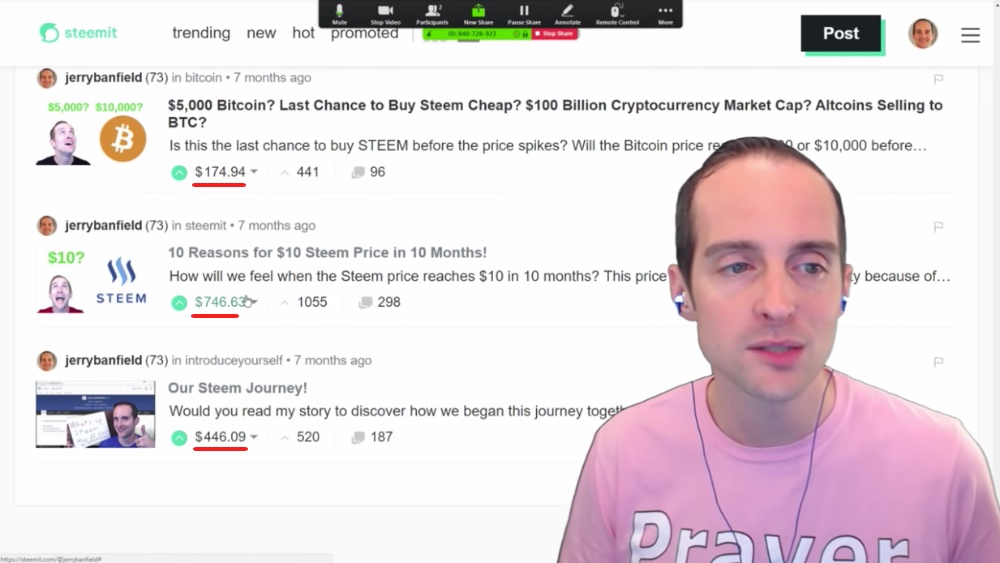
Every post after this is earning $80 or $100, except for one $20.

Then, I have a post with $3,382 and another one with $1,669.
This is way above average to start.
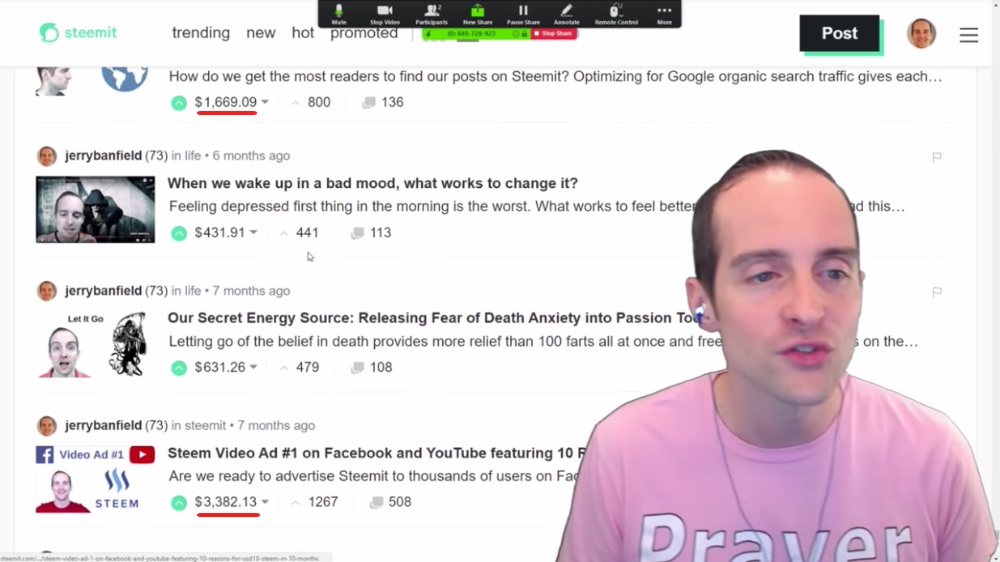
Terry Brock:
Oh, yes!
Sorry, Jerry, let me interrupt you for a moment here.
What did you talk about for that $3,000 or $4,000 post?
What was the subject matter on that?
Jerry Banfield:
That post was actually a crowd-funded ad campaign. I agreed and gave all of the author rewards from that to advertising Steem. Every upvote on that contributed to advertising Steem.
I will show you two different things on Steem. Now, I started out making hundreds of dollars on average on every post for months on Steem, and then for a while almost $500 on a post for months, and then we get the dip.
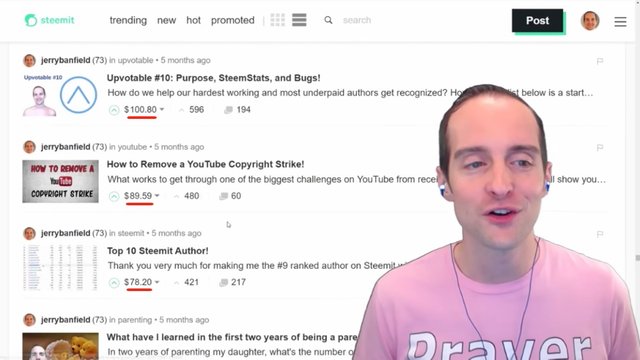
Now, everything is relative in life. When you are really excited and you are earning a whole lot of money, coming down to $50 on a post, coming down consistently then to $60, getting huge downvotes like $80 on several of my recent posts, I feel like, "You know what? This is stupid."
I have thought about it several times like, "Screw this. There are lots of ways I could make more money than posting on Steem," but that comes back to the motivation. I’m not here just to make money. I am here to do some good, to contribute, to be of service to the world. I’m not here just for me, I’m here for everyone else that might benefit.
The dip on Steem for me has been brutal lots of times. There have been stretches where I had to stop reading the comments. My wife suggested not to read them on one recent post. The comments are just all things, "Jerry you suck," or pictures of private parts.
The dip is brutal, but it helps check your motivation like on this recent $27 post, which has an $80 downvote on it.
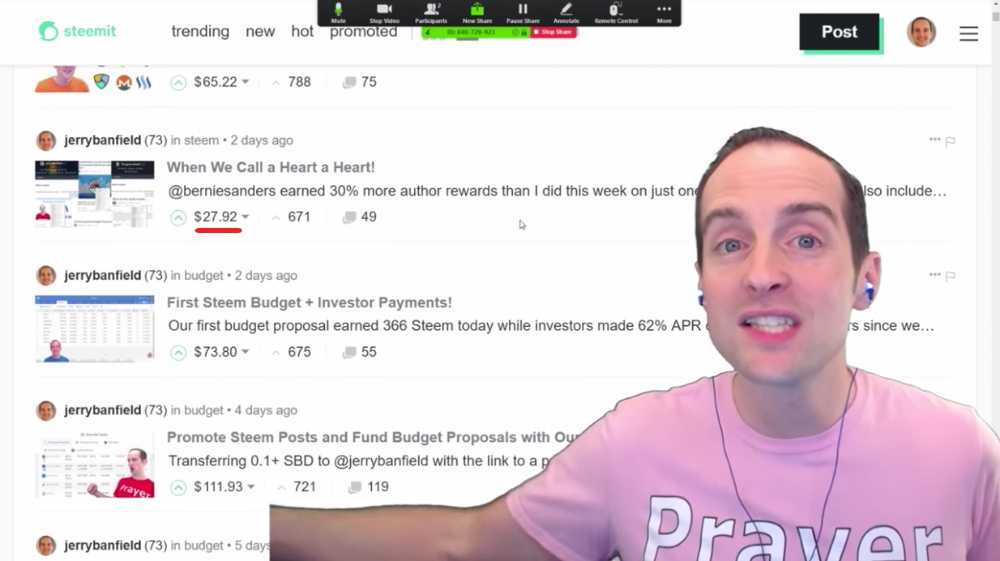
It’s not just that, it’s comparison, looking at other people earning $600 who have promoted something purely self-promotional, we might say, that does no good for the community and earning a bunch of money.
The dip on Steem is brutal whether we start out well, or as most of us can expect to earn nothing when we start out on Steem.
I applaud @terrybrock. If we look at Terry’s first few posts, he started out with $0 on his first post, $0 on his second, 18 cents on his third post.
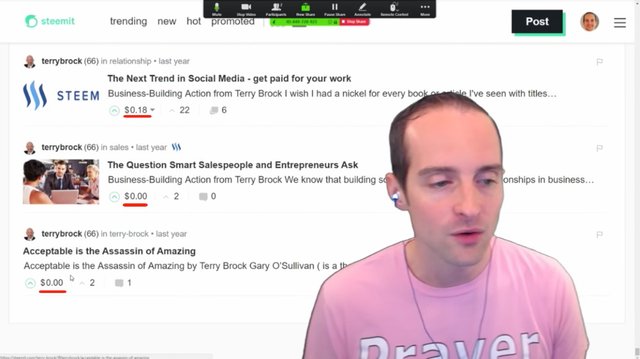
Then, a post with $16 and $13 here.
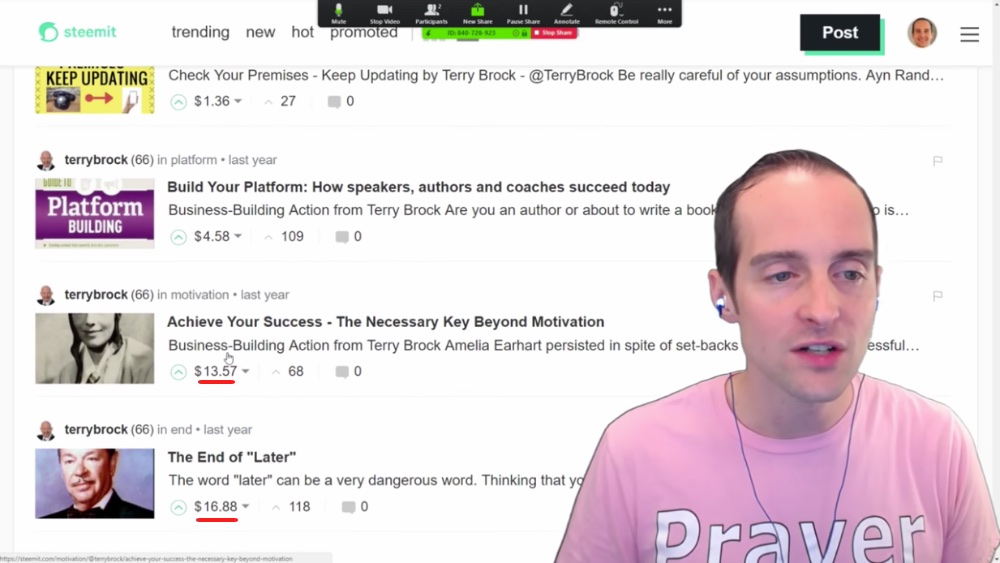
Terry is used to earning a good income on things. He is an international speaker and a big deal in the world, and therefore to come on Steem and to get like a dollar, it’s very easy for him to say, "This isn’t worth my time to write something and not get any money for it."
@terrybrock went through the curve here until seven months ago. Then, he stopped for a while and he came back, and then he got $108 after writing like 15 or 20 posts.
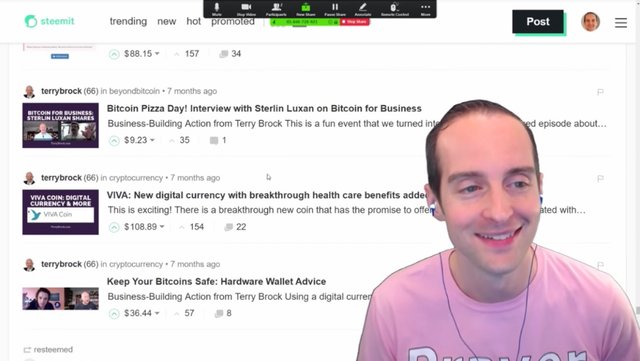
You finally got a good income on one post here.
Terry Brock:
Yes, it took a while. It takes a lot of practice, and those of you reading this, think about that. It takes a while. Sometimes you got to trudge through. You got to keep going through the grind. You have to be hanging in there in that grind. You just stay with it. You don’t give up, but also you don’t just keep doing the same thing. You keep exploring. You learn what to do and how to get ahead because you are always learning on that.

As a matter of fact, there is one thing that I want to ask you about Jerry, one thing that people that know you really admire about you, and I can say it just from knowing you both off camera and on camera, many different places in the US as well as overseas, you are brilliant. You keep learning. You are learning a lot.
How do you learn about all this stuff that’s out there on Steemit and other areas?
What procedures, what steps do you go through personally to learn and to bring all that stuff into that wonderful noggin of yours?
Jerry Banfield:
Terry, I appreciate your kind words, it takes one to know one. I say a lot like you do and in fact so much that you already mentioned it very clearly in your TEDx talk.
I will go over here and look at Terry’s website for a minute.
Terry has a TEDx talk I recommend watching.
It's called, "How to Overcome Overwhelmed."
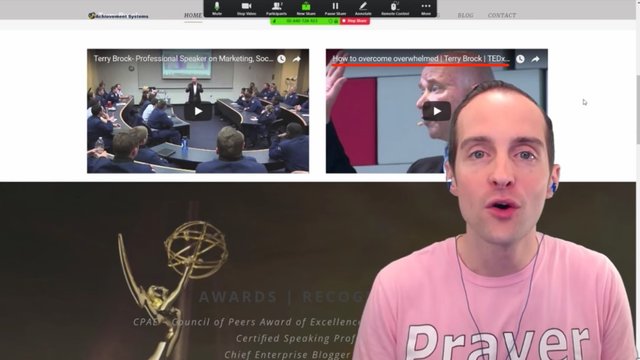
What we notice is the mindset. The way we think is critical to everything else that happens. The way we think determines everything we get.
One thing I loved in this talk Terry gave is that he mentions in The Matrix where there's a scene with Neo and with Trinity, a helicopter is flying up to rescue them and Neo asks, "Do you know how to fly that?" and Trinity says, "Not yet."
Now, obviously starting right there I had no idea how to fly a helicopter with the open mind that it's possible for me to learn how to fly that helicopter. In The Matrix, they just download something into their brains. It's just kind of robotic, but in what I do in my learning that's how I look at things.
This morning I'm planning on starting a Bitcoin price live stream that has my music on the background and what I notice in that, an ambitious undertaking, and I just look at it like I don't know everything yet, but I know what I need to figure out, which is how to get beautiful charts on my live stream 24/7.
So what I will do is just sit there and start googling. I ask myself, "What don't I know? What do I need to know?"
I just start googling and looking around. I just get into things and the key is I'm willing to fail at stuff.
Terry Brock:
Ooh! That's very important to be willing to fail at something. Those of you who are reading this, take that down. Write that down and circle it. That is really important: "Be willing to fail."

But then, Jerry, it hurts. We don't want to fail.
How do you go through the pain that's going to be there?
Jerry Banfield:
You need other people. Other people are the key going through pain. Using Steem for me has been one of the most painful things I've done in my business.
If we look at these dips where @terrybrock is going from hundreds of dollars on a few posts, then down to $1.29, it's painful. I'm used to getting $100 on a post, and then I get an $80 downvote and earn $27.
Our minds adjust relatively to where we are at. Someone earning a dollar gets downvoted to ten cents, it's probably about just as painful as a hundred dollars down to $27 or whatever.
I can't tell you how many times, it's probably been fifty or a hundred times I've cried or hurt over things on Steem, then I face the pain and I go through it.
I've made posts that have just hurt a lot and it's because of the reaction and people bring out the tools of judgment, criticism, shame and condemnation. It hurts to look at the human race and just see how we are sometimes. It hurts to see how separated we feel from each other. It hurts. All the ego and battles. It hurts to look at these and see how they are.
I listen to one thing that helps me a ton. I listen to a lot of books. I would say this is one of my main tools and I know Terry you read a lot as well. I listen to a ton of books. I'm always buying and listening to new books.
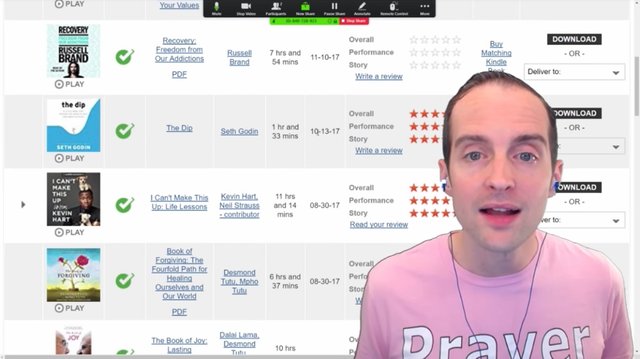
I use well-rounded learning approaches. I read things online, I google things, I do things and I then listen. I think one component a lot of us are missing in our learning curriculum is essentially audiobooks, something that we can listen to.
Every book I listen to helps.
"The Dip," that I've just mentioned several times, by Seth Godin. I just happened to listen to that book right when I was going through my worst dip on Steem. It was extremely helpful.
Kevin Hart's book, "I Can't Make This Up: Life Lessons" is extremely helpful.
"Book of Forgiving" and "Book of Joy," I'm just finishing this up.
I listen mostly to non-fiction books. I listen to a lot of stories, a lot of Eckhart Tolle. The books I listen to help a ton and that's a huge part of it.
Terry Brock:
Yes, I think that's really good, and those of you who are reading this, think about what Jerry just said.
He's listening to books.
He's constantly saturating his mind with good quality information.
Could you think about when you are driving along, what are you doing?
Listening to the radio?
Having the same songs?
I mean, come on.
Please!
It's interesting to know what's going on, what's happening in some place, but really, does it matter to you that over at the corner of 4th and Main a really bad thing has happened?
You know, this has happened versus saturating your mind with something that's going to help you live your life better.
A+ quality material that you determine is A+ according to your criteria and what you want in your mind. That's where you should spend your time. That's what Jerry is doing and that is a large part of why he and other people who do it are successful.

They are exercising filters. There are some things you go, "No. I'm not going to spend my time digesting that."
I often think about, and Jerry you might relate to this as well, over here in Orlando they have this morning news show things go on and they say, "Last night there was a terrible tragedy over at duh-duh-duh-duh and duh-duh-duh, we tell you about it right now."
Think about it for a moment.
Would you want to buy a DVD, a CD or a mp3 of that recording three months from now?
Even tomorrow, you wouldn't care.
Or there's a tractor/trailer turned over and traffic is jammed over there, does that stuff really matter long term?
No.
Versus saturating your mind with a good book.
I love reading books and I do a lot of listening on podcasts. My new baby is in now, it's a Samsung Galaxy Note 8 and I love that thing. It's really cool. I've been programing the podcast to go over there from my iPhone and now I have them both, but saturate your mind with good things and working with that.
Jerry, you are reading a lot of books by listening to them. Do you read very many books like sitting down with a book reading it either on Kindle, electronic or the old physical books?
Jerry Banfield:
Yes, sometimes I do that and that was for the Alcoholics Anonymous book I read. I mostly read that and continue reading it in the hard copy. I don't listen to that. I have daily inspirational books I read. I read those in the hard copy every day.
I love everything Brené Brown does and if she doesn't narrate the book, I prefer to read a hard copy like I'm reading "Daring Greatly" right now. She is so good at narrating her books that I miss her when listening to a different author.
I've also been reading "Tools of Titans" by Tim Ferriss in hard copy because it's not narrated on Audible, at least the last time I checked.
I basically try to use Audible most of the time because I do so much on the Internet with looking around, googling and reading online that I'm kind of burnt out on reading things by the end of the day.
Now, if I stopped using the Internet, I'd probably read more, like when I was younger I used to read a lot of books.
Terry Brock:
I think it's good.
Well, one of the things that really helped me a lot years ago was when my friend Zig Ziglar, who was a well-known speaker and member of the National Speakers Association with me, would say that one of the things very important to always remember is when you are moving, you want to listen.

When you are driving along or you are walking or something, if you can and it's appropriate, listen, and then when you are sitting, read.
The idea is that you continually saturate your mind. I think it really ties in with the phrase of something I know you are doing Jerry, "Lifelong learning."
You have got your bachelor's degree, you have got your master's degree also, but a lot of people might say, "Okay, I can hang it up now. I don't need to learn anymore," not Jerry Banfield.
Jerry Banfield and other really successful people are those who say, "Okay. I'm going to continue learning. I haven't read about that. Oh! I didn't know about that," and you are constantly learning new things.
How does that relate to the overwhelmed that we often have?
I talked about how to overcome overwhelmed.
How does that relate to the overwhelm of Steemit, cryptocurrencies, blockchain, all that's going on?
How do you get set in that particular area?
Jerry Banfield:
Exactly what you said about filtering. I realize that the primary choice I have is where I go, what I do, what I hear and where I position my body. That's my primary option. In other words, that includes everything like what I have on my screens, what I'm listening to on the radio and that helps me a ton with overwhelm.
One thing I do, I keep an open schedule. I have two things on my schedule today, which are this interview with you Terry and my AA meeting. That's all I have on my schedule the whole day.
In other words, I seek to be the opposite of busy. I like to keep where I feel I have a flexible schedule, where I have time to do everything important every day, and I say no, too. I set systems up to keep people out.
I try to focus on just doing what I need to, and then accepting my limitations that I don't have time to respond to everyone that emails me, unless I drop everything else I'm doing and only do email. I don't have to come to an interview with everyone.
Terry Brock:
That is the words of wisdom. You have got to be careful. Correct me if I'm wrong, but I think over in St. Petersburg Florida where you are, there are only 24 hours in the day?
Is that correct?
Jerry Banfield:
That's correct, Terry.
Terry Brock:
What an amazing thing!
If you think about that, people, it's been said many times those of you who have been reading this, think about it: "You have the same amount of time as anyone else."
I just finished a video that I'm going to do later on Steemit of an article where I was looking at how executives and how important people, including the President of the United States, allocates time, whoever that president is. It's not a political thing, but it's just what you do, you have to filter.
Like Jerry says, you got to learn to say no. I think it is Warren Buffett who says, "You got to say no a whole lot more than you say yes," and successful people are those who say no more often to the things that are not quite as good. You want to focus on those areas that are going to be really good for you and if it's not good, get rid of it.

You don't need that! Get it out of your life if it's not going to be that good.
Jerry, that's a really important thing, you find that this helps you as you did in school. Is that helping you now in life making a living?
Jerry Banfield:
Well, I didn't do that for most of my life. I was very easy to say yes to things, and then not to have time for the things I really wanted to do. I would then get into things like addictions, like alcoholism and related behavioral addictions or substance addictions.
These are often things that people who are very agreeable, that say yes often, take up addictions to help get some personal space, because once I started drinking it didn't matter if I told you I was going to help you move the next day. I was going to do whatever I wanted and if I wasn't in the shape to help you move, it didn't matter what I said.
I feel like we are busy because most of us are agreeable people. If you ask us, "Will you help me move or would you do this?" A lot of us don't even stop to think not just if it is best for me, but if this is best for everyone. Is this best for my family if I just blindly agree to help someone move without checking with what my wife's doing that day?
What I try to do is think of what do we need today?
What would it be best for this body to do in relation to all the other ones instead of just asking, what do I want to do today?

That has led me off to a lot of answers that didn't help anyone else and that hurt me.
I ask, "How can I help today? What do we need me to do today?" and then that kind of clears out most of the other things, like we don't need me to make another video course and try to sell it and make hundreds of thousands more dollars. We don't need that. We need an interview with Terry that's available for free for everyone.
Terry Brock:
Yes, I think you are right. You are establishing the criteria that's right for you, and then you are holding very strictly to that, learning to say no to those areas that aren't.
Well, Jerry, we could go on for several more hours and as a matter of fact for those of you who are reading this we are going to. We are going to do it, not right now, but we are going to extend it because Jerry already has a great body of work out there. He's got many videos that you can tap into free. I mean it's free as far as costs go. It will cost you some time and will cost some effort, and I encourage you to put that in there.
It is like if someone said, "I want to become a doctor. I just don't want to go to medical school."
No, you are not going to get there. You got to put in the effort. You got to do it, and now, here it is, it's available.

I would encourage you to continue this conversation with Jerry by watching the videos and the wealth of information he has on the technical side as well as, you can tell from this wonderful guy he is a deeply caring human being.
The person's got a big heart and I can say he's this way not only on camera where I've seen him, but one-on-one when the camera is not rolling, he is genuine and he is real. He is a man you want to get to know.
Well, Jerry, before we let you go, any final words that you'd want to say, and I am not going to let you get out of here without telling people how they can get in touch with you.
Jerry Banfield:
Well, how you can get in touch with me…
That's a good transition after we talked about saying no and saying you just can't get in touch with me.
How about that?
Terry Brock:
That's good, there are ways they can't, but there are ways they can watch your material and see that.
What would be the best way for them to watch your material?
Jerry Banfield:
On Steem is the best way to watch what I create right now because you have got the option to read and to watch a video on a lot of my posts.
You can read the entire post if you want to or at the end of a lot of the posts, then there's a video of the same post. So, you can read or watch in one place.
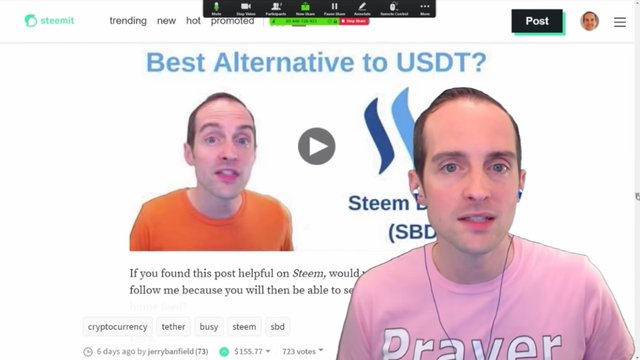
The place I'm most likely to check the comments for free is on Steem and if you'd like to contact me and build a relationship with me over time, I've got a Discord server and that's at the end of my Steem posts, which are often very long.
There's a link to the Discord server, it's at jerrybanfield.com/contact/, and then I've got a free Discord server that anyone can join.
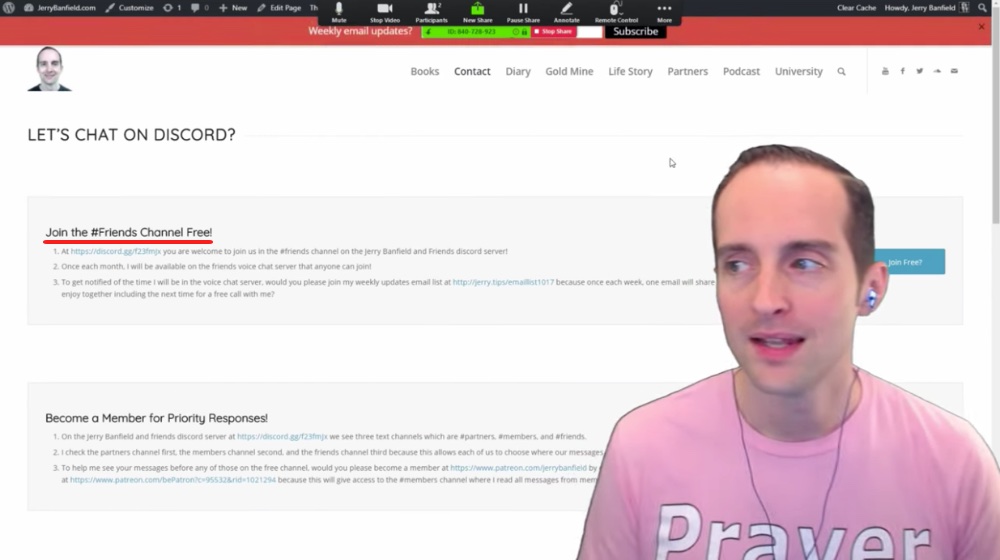
What I do, I've got a partner program that helps me prioritize my communication. So, if you are a partner then I check those messages first, and then once I've responded all the partner messages, then what I do is go down and look at the messages for free that are in the Friends Channel.
Right now, I just started this so I'm having a good easy time responding, but part of the problem is if you want to build a lot of influence and followers that also tends to ruin every different thing too.
Terry Brock:
Yes, well, that's part of the reality of life and we see that today we have got to be able to have the criteria set up and put it in there, in place.
Jerry Banfield, you are a person who has helped so many people. You have helped me personally and right here in front of God and everybody, I'm letting you know I really appreciate you, sir.
I'm glad to know you, glad to have you as a friend and looking forward to many more good things that you and I will create in the future.
Before we finally let you out the door, are there any final words you want to leave for the folks that are with us?
Jerry Banfield:
Thank you.
I pray in the morning I say, "God let me remember. Thank God throughout the day." The simplest prayer we can do is just "thank you" and almost like a chant it breaks up things when they are uncomfortable too, like a car pulls right in front of you and you have to slam on your brakes instead of "F. You," it's nice to go to "thank you." You know, like "thank God we didn't wreck," and that little change, that's been a huge one for me.
Terry Brock:
I like that.
Jerry Banfield:
Thank you for having me and I will be repeating "thank you" the rest of the day.
Terry Brock:
You bet.
Jerry, I'm saying thank you to you and also to those of you reading this or watching the video at the end of this post.

Thank you for taking your time and your energy to be here and I would remind you that seldom does one exposure to new material, particularly as good of material as this is, really help it to last long-term.
What you want to do due to the wonders of technology today, it's very easy to go back over it and have that pen and paper ready, or that note-taking device of choice ready to go and you say, "Okay, I'm going to write that. Oh! I missed that the first time. I forgot about that," and go back and do it again, and so be alert to stretch your brain, to learn and to go over and repeat these, and then stay in touch with Jerry, stay in touch with me.
We'd love to hear from you and love to get those upvotes that matters over here on the Steemit side. We want to hear from you.
So, on behalf of Jerry Banfield, I'm Terry Brock, thank you for joining us today.
Jerry Banfield:
Thank you very much, Terry, for having me. I'd like to do the same kind of conclusion for you here on the video.
I'm very grateful that Terry Brock and I have just done this interview together. I think Terry that the best place to get connected with you is on terrybrock.com, and then you have got a contact page.
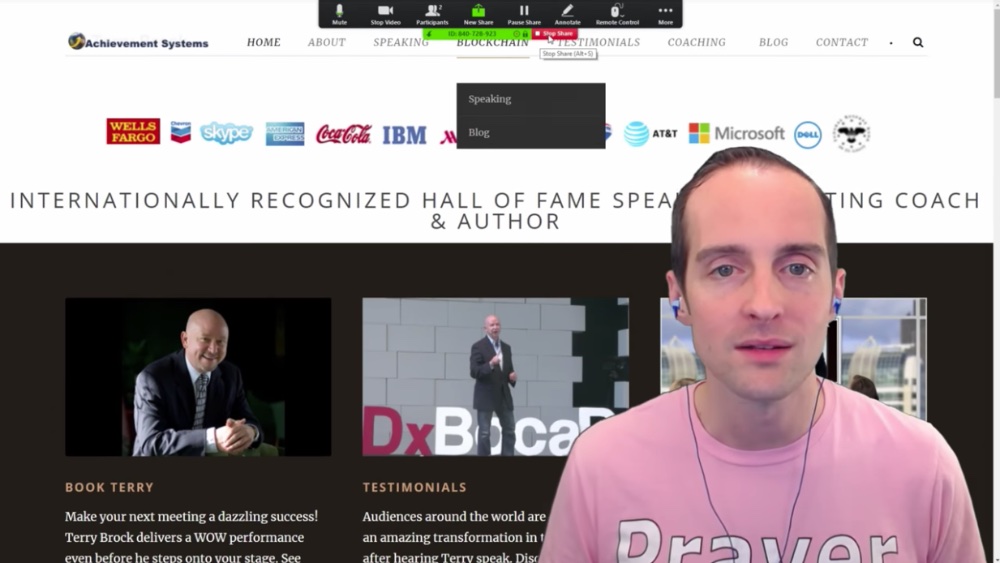
People can email you directly, and then if you want to hire Terry for speaking and especially in Orlando, you can get a hold of @terrybrock for speaking.
Terry Brock:
You know, just about anywhere on planet earth. I haven't done a whole lot up on Neptune yet, but I've got enough frequent flyer miles to go there.
But yes, that'd be the way to get in touch with me, Terry Brock, and for those of you listening on audio on this, that is spelled T-E-R-R-Y and Brock is spelled the right way B-R-O-C-K.
So that's terrybrock.com, and I will look forward to hearing from you.
Jerry Banfield:
What's the wrong way to spell Brock?
Terry Brock:
There's a whole bunch of them, so we are not even going to go into that. Don't even think about those wrong ways to go. We are going to do it the right way.
Jerry Banfield:
Well, thank you, Terry, for doing this interview with me. We hope you have enjoyed this and thank you for your time today.
Terry Brock:
You bet Jerry. Always good to be with you, my friend.
Final words
Thank you for reading this blog post, which was originally filmed as the video below.
If you found this post helpful on Steem, would you please upvote it and follow me because you will then be able to see more posts like this in your home feed?
Love,
Jerry Banfield with edits by @gmichelbkk on the transcript from @deniskj
Shared on:
- Facebook page with 2,226,859 likes.
- YouTube channel with 219,999 subscribers.
- Twitter to 103,989 followers.
Our Most Important Votes on Steem are for Witness!
Would you please make a vote for jerrybanfield as a witness or set jerrybanfield as a proxy to handle all witness votes at https://steemit.com/~witnesses because we are funding projects to build Steem as explained here? Thank you to the 2500+ of us on Steem voting for me as a witness, the 2 million dollars worth of Steem power assigned by followers trusting me to make all witness votes through setting me as proxy, and @followbtcnews for making these .gif images!
Or
Let's stay together?
- If you want to stay updated via email, will you sign up either to get new emails daily at http://jerry.tips/steemposts or join at http://jerry.tips/emaillist1017 to get an email once a week with highlights?
- If you would like to build a relationship with me online, would you please visit https://jerrybanfield.com/contact/ because I would like a chance to get to know you?
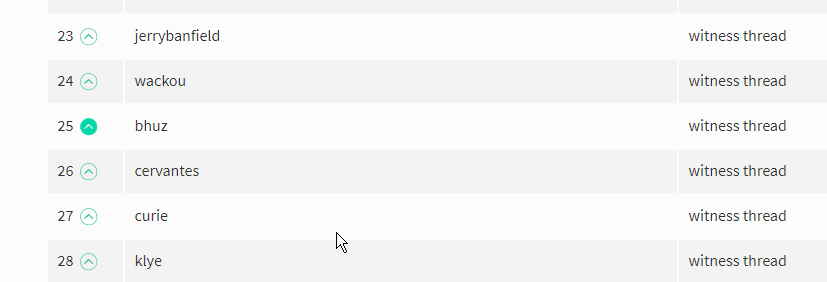

Hi just passing by to see my witness I voted for. Things look good Heh
good
Today morning when I saw the market cap I first shocked when I saw the steem price and then I remember your youtube video in which you were predicting the price of steem and spreading awareness about steemit that " This is the right time to buy steem when the prices are too low , because its very hard to buy it when it will skyrocket " and the is happening right now !
Thank you for being our witness here !
Pretty cool guy!
I actually prfer when interviews are written down like this instead of a video. It gives you an easier access to info. Thank you!
Me too. I sure do appreciate the effort to transcribe an interview, so I can read it rather than passively listen.
@Jerrybanfield and @Terrybrock, It's great to see you two again! Both of you are very wise, experienced and full of information. Terry is always excited and on fire when he speaks and it's always a great pleasure seeing him. I remember watching the video a while back and it's seems like you (Jerry) have been busy and are posting it a bit late but it's still a pleasure to watch it again. I agree with you guys about many things, most importantly, including free speech.
And Jerry, if Steem goes to the moon (and it certainly is heading towards there as we speak) I will certainly owe a you big thank you because you are the one that convinced me to invest in the platform :)
Cheers,
Yusuf /@Generation
Hello, Jerry!
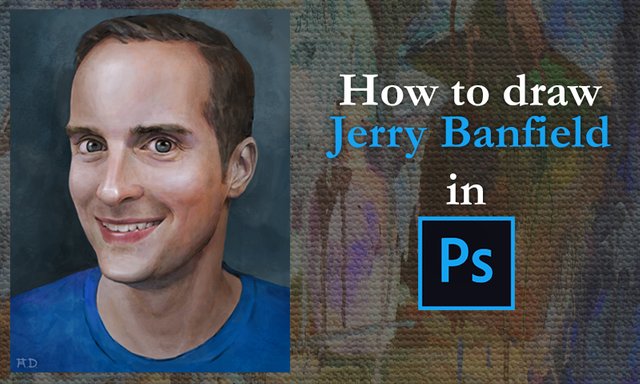
Check out the portrait :)
ROFL, its Jerry with a lot of hair.
I would love to see Jerry's reaction to this painting!
Thanks a lot, this information is very inspiring and valuable :D
Nice post beautiful presented and explained. detail oriented with nice pics. thank you for sharing this with us, Upvoted
If you mind checking out my blog @kingjan
I am going to watch the video instead of reading this post for 1 hour!